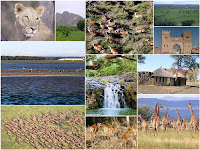Cry Kibera
It is in Kenya and yet it isn't a part of it; it is within Nairobi and yet it is without. Is it autonomous? Is it an island in Nairobi? No. It is Kibera! Forsaken, neglected and forgotten Kibera. Forsaken, neglected and forgotten by those in power; by the government, the local Nairobi city authority and those who decide. Kibera - is the 2.5 square kilometers home, to half a million to seven hundred thousand Nairobians; more than a quarter of Nairobi's population. No one knows for sure how many people live in Kibera; population density is estimated at 3,000 people per hectare -- 750,000 people in one square mile -- or no more than 37 square feet per person. It is one of the most crowded places on earth. 'Six hundred acres of mud and filth, with a brown stream dribbling through the middle.' This is 'Africa's largest slum'.
Kibera has no proper infrastructure; no proper piped running water or electricity supply; and no drainage or sewage system. Now. This - after almost forty three years since Kenya's independence from the British! 'Due to lack of most basic services, the residents of Kibera each day must, among other problems, endure the sight of filthy narrow alleys, and sludge and human waste from shallow latrines flowing into nearby streams, a situation that gets worse during the rainy seasons.' Kibera is said to be: 'on no map, its 550,000+ people -- one out of every five Nairobians -- cartographically invisible. One of the many roads in (all unpaved, most only a few walkers' wide) rises at a twenty degree angle in yellow dirt. Every day thousands of Kiberans walk several miles to and from their work, formal or informal as it may be.'
And yet; and yet: just a short distance from Kibera are people living completely, totally - differently. In posh homes with manicured lawns; people with expensive cars and all the facilities and infrastructure of a modern world. Try to think this in any language; in any terms - this just doesn't make sense! At all. And it's very disheartening and sad. How can a people leave its own, to such misery and squalor? It beats me.
'Kleptocracy impoverishes, and is therefore unsustainable long-term. But the human cost along the way is intolerable.' Kibera is the worse 'human cost' in Kenya, caused by Kenya's corrupt politicians and rulers - who, have through the years since independence, mismanaged and looted the country and enabled only a few; the very few, to benefit and live well. With no care or consideration for the multitudes of others.
Even with all the recent changes in Kenya's political scene and government, the people of Kibera have seen or noted very little positive change to/on their lives. Is there hope for them? 'As long as there are bright-eyed children, there's a reason to work really hard to figure out how to make the economics work to change the world.'
As always, my thoughts are, ever - swayed and moved, by thinking of children. In Kibera, just as in any other part of the world: of humans, it is children who give most hope and joy. Whenever visiting Kibera, I have always been, both - very saddened at the conditions children there live in but at the same time, it is they who give me the most joy and hope.
Related reading: Weblogs, Warm Africa, CSG Kibera,
Kibera has no proper infrastructure; no proper piped running water or electricity supply; and no drainage or sewage system. Now. This - after almost forty three years since Kenya's independence from the British! 'Due to lack of most basic services, the residents of Kibera each day must, among other problems, endure the sight of filthy narrow alleys, and sludge and human waste from shallow latrines flowing into nearby streams, a situation that gets worse during the rainy seasons.' Kibera is said to be: 'on no map, its 550,000+ people -- one out of every five Nairobians -- cartographically invisible. One of the many roads in (all unpaved, most only a few walkers' wide) rises at a twenty degree angle in yellow dirt. Every day thousands of Kiberans walk several miles to and from their work, formal or informal as it may be.'
And yet; and yet: just a short distance from Kibera are people living completely, totally - differently. In posh homes with manicured lawns; people with expensive cars and all the facilities and infrastructure of a modern world. Try to think this in any language; in any terms - this just doesn't make sense! At all. And it's very disheartening and sad. How can a people leave its own, to such misery and squalor? It beats me.
'Kleptocracy impoverishes, and is therefore unsustainable long-term. But the human cost along the way is intolerable.' Kibera is the worse 'human cost' in Kenya, caused by Kenya's corrupt politicians and rulers - who, have through the years since independence, mismanaged and looted the country and enabled only a few; the very few, to benefit and live well. With no care or consideration for the multitudes of others.
Even with all the recent changes in Kenya's political scene and government, the people of Kibera have seen or noted very little positive change to/on their lives. Is there hope for them? 'As long as there are bright-eyed children, there's a reason to work really hard to figure out how to make the economics work to change the world.'
As always, my thoughts are, ever - swayed and moved, by thinking of children. In Kibera, just as in any other part of the world: of humans, it is children who give most hope and joy. Whenever visiting Kibera, I have always been, both - very saddened at the conditions children there live in but at the same time, it is they who give me the most joy and hope.
Related reading: Weblogs, Warm Africa, CSG Kibera,


